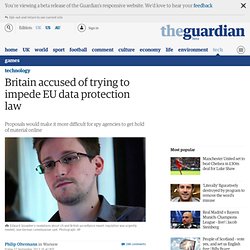

Data Protection Day. Today, 28 January, is Data Protection Day.

Commemorating the signing of a Convention 33 years ago today, the day aims to promote awareness and education of privacy issues. Protecting personal data remains an important principle and right – but in a fast-changing technological reality. Back in 1980 when the OECD first attempted Guidelines in this area, typewriters were still in common use; a "storage facility" probably meant a filing cabinet. When the EU agreed its current Data Protection Directive in 1995, the internet was just coming onto the horizon, and Mark Zuckerberg was just 11. Since then, the world has changed. As my colleague Viviane Reding has many times underlined, data protection is a fundamental right; agreeing on the data protection reform proposed by the Commission in 2012 is vital to boost confidence and protection, and make the rules relevant in a modern, technological era.
US officials on Safe Habour. EU-US safe harbor: “may not be so safe” questions European Commi. Britain accused of trying to impede EU data protection law. Britain has been accused of trying to impede data protection reforms that would make it more difficult for spy agencies to get hold of material online.

The European parliament is planning to vote on a new, unified law for EU member states in the next few weeks, but activists fear Britain is deliberately obstructing the path to new legislation. Speaking at an international conference on data protection in Warsaw on Thursday, the UK information commissioner, Christopher Graham, said the first draft of the proposed regulation was "too dirigiste". Britain was "not interested in regulation that is a to-do list". The first draft of the new general data protection regulation was presented on 25 January 2012. Following the revelations about the extent of US and British surveillance from Edward Snowden, one German commissioner said there was an urgent need for regulation.
The standoff between Britain and other EU countries has several dimensions.
LTEC 2012 - CrossBorder Ediscovery. EU Commission will link data retention reform to e-privacy reform in 2013. EU home affairs commissioner Cecila Malmström has announced in an interview with German newspaper Frankfurter Allgemeine Zeitung that she will not propose a revision of the notorious data retention directive this year.

Instead, she will work with information society commissioner Neelie Kroes to review the e-privacy directive and the data retention directive together in 2013. This is big news. Malmström and her services have been struggling with the data retention reform for almost two years. Now she and Kroes want to reform it together with the e-privacy directive in a package, both closing loopholes for further data use in the latter and reducing retention periods and police access in the former.
My reading is this: The liberal Malmström does not know how to get out of this data retention mess in one piece, with activists and "the internet" (c.f. Time for some interesting coalition-building of institutional players, activists and lobbyists all across the field. Expect 1,000 objections by Member States to the EU’s Data Protection Regulation. - Hawktalk. Document_id29. 20120227_letter_cnil_google_privacy_policy_en.
Google 'fails to meet EU rules' on new privacy policy. 28 February 2012Last updated at 16:58 Google's been letting users of services know that its privacy policies will change on 1 March Google's new privacy policy may violate the European Union's data protection laws, according to the French data regulator.

The search giant plans to unify 60 different privacy policies across its products from 1 March. But EU regulators had urged a "pause" so they could analyse the changes. The French regulator, CNIL, said that the policy "raises deep concerns" and that it fails to meet the needs of the European Data Protection Directive. Vice-President Viviane Reding - European Commission - Speeches - Speeches. Protection of personal data - Justice. Whenever you open a bank account, join a social networking website or book a flight online, you hand over vital personal information such as your name, address, and credit card number.

What happens to this data? Could it fall into the wrong hands? What rights do you have regarding your personal information? Under EU law, personal data can only be gathered legally under strict conditions, for a legitimate purpose. Furthermore, persons or organisations which collect and manage your personal information must protect it from misuse and must respect certain rights of the data owners which are guaranteed by EU law. Every day within the EU, businesses, public authorities and individuals transfer vast amounts of personal data across borders.
Committee on Industry, Research and Energy. European Commission sets out strategy to strengthen EU data protection rules. Brussels, 4 November 2010 European Commission sets out strategy to strengthen EU data protection rules What happens to your personal data when you board a plane, open a bank account, or share photos online? How is this data used and by whom? How do you permanently delete profile information on social networking websites? Can you transfer your contacts and photos to another service? Q&A: How Do You Define ‘Privacy Harm’? - Digits. Could Europe’s Tough Privacy Protection Proposals Influence Washington, D.C.? - Kashmir Hill - The Not-So Private Parts.